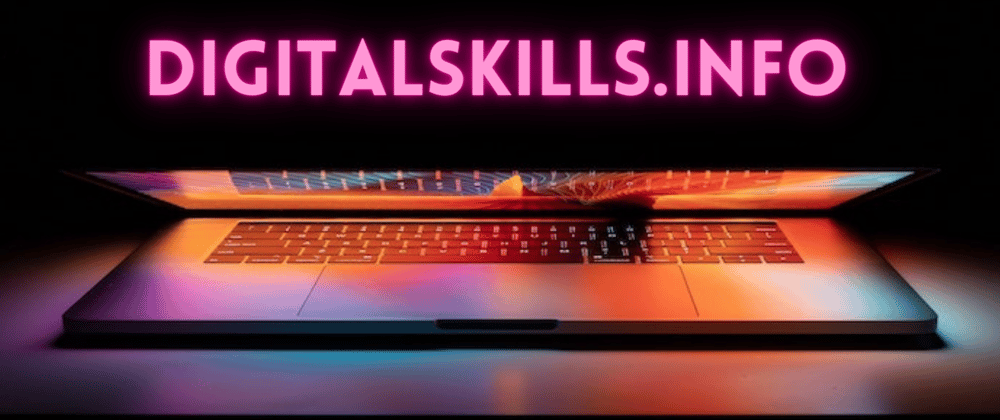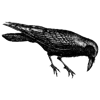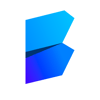A Not-For-Profit Educational Organization
Digital transformation is a popular buzzword used to describe the practices that corporations and government bodies, around the world, use seeking to remain relevant in the digital age.
The leaders in legacy institutions know that you have the power to displace their empires from your living room, and are spending billions to update their practices, before you get around to doing that.
Since the creation of the World Wide Web in 1990, and the introduction of electronic payments a few years later, megalithic industries have been brought to their knees, and the opportunities for anyone with an internet connection have been rapidly on the rise.
Digital transformation is all about becoming a digital enterprise—an organization that uses technology to continuously evolve all aspects of its business models (what it offers, how it interacts with customers and how it operates). - Digital transformation: A PRIMER

Digital transformation market size in Billions. U.S. 2014-2025
This is a long article, click here if you want to skip my story and jump straight to information about the org.
Opportunity knocks
I grew up with computers, in the early days of the web. I've always been good with computers, but I had no profitable ambitions. I couldn't comprehend what massive opportunities that were slipping through my fingers.
A few years ago, I quit drinking and gave up a freewheeling lifestyle. I needed to create a new life for myself, and decided to get serious about tech.
I could see clearly, how if I had been focused growing up – if I had consistently created and worked towards almost anything online – by now I would have likely found my way into a number of profitable ventures.
I could see, also, just as clearly, that the potential is greater than ever, and I refused to let that opportunity keep passing me by.
The sky's the limit

by 12019
In the beginning, I started out in the same places most people do: micro jobs and click work (think surveys and random small web tasks) with Amazon's Mechanical Turk, freelance sites like Fiverr and Upwork, and (growing massively, in demand) audio\video transcriptions.
I've always loved to read, so I thought writing might be a good fit for me. I began advertising my services writing articles on tech trends like AI and Blockchain. I didn't know anything about those subjects, but I was willing to accept low paying gigs to learn.
While doing research for the articles, I was constantly irritated by the mass quantity of fluff content, online. I spent a ton of energy reading and sifting through search results, trying to determine where reliable information lives.
Where most people are trying to write as quickly as possible, I pushed the other way, with the aim of creating detail rich articles, with plenty of references, so the readers could easily continue exploring, and check the source of essential information.
That's when I began collecting sources for a variety of subjects and thinking about how to facilitate people sharing their internet research with each-other, to make it easier for everyone to create quality content.
From there, I became far more interested in curation than writing, and eventually got into some contract based research work. More recently, I've found that transcribing podcasts to be an efficient use of my time.
It gradually became clear that people were making good money from my efforts, and there's far more potential in putting that energy towards a venture of my own.
The shortest distance between two points

by @amanshuraikwar
In that time, I've listened to thousand of podcasts (my favorite educational medium) listening for countless hours on everything from philosophy to complexity theory. I've put in time reading hacker news and following accounts from various technical industries, on twitter, all day every day.
In that way, I've learned how people in various industries communicate and how they look at world, seeking to discover the scope and boundaries of various technical domains, and their intersections with more traditional domains.
I've learned to use Linux, OSX, and how to use tools written in a variety of different programming languages. I learned to publish websites for free on GitHub, deploy web applications in the cloud, and used services such as AWS Free Tier for tasks including automatic transcriptions, running a server in the cloud, and setting up my own vpn.
While I didn't need to do all that to be employable online, concentrating my attention on difficult subjects also helped me through the most difficult years of my early recovery. Looking back, there are a number of more direct routes I could have taken towards a sustainable income.
The hardest parts of learning online

The Hard Thing About Learning Hard Things
One problem with all of this is that there isn't a strong consciousness around what are the fundamental digital skills? What are the basics you should know to be conversant in the digital sphere? What should you work on first, when trying to make a living on the web?
It's hard to make those type of decisions if you don't even know what your options are.
The answer to those questions will depend on your interests, and what are your pre-existing skills and talents. Not that we always immediately recognize where our personal value lies.
Even having a strong digital literacy, starting out, I had no clues how to go about building a sustainable income online, and spent a lot of effort figuring things out the hard way.
While there's a lot of educational resources online, much of the content is published in misguided attempts to rank with shady SEO practices, not to edify the masses. Especially in the beginning, it was exceedingly difficult to find the information I needed to know.
One of the biggest problems people face is all of the time necessary to figure this stuff out. Especially if they're not getting paid for the considerable efforts required, during the earliest parts of the learning curve.
A not-for-profit educational organization
None of the problems around learning digital skills are particularly hard, but this is an entirely new educational paradigm who's infrastructure is simply under-developed. Moreover, the incentives of legacy educational institutions don't always seem aligned with the interests of their students.
These are the experiences which led me to the idea of creating a not-for-profit educational organization who's students teach each other digital skills. Members of this organization get the opportunity to learn digital fundamentals by building the organization, creating it's curriculum, knowledge base, and ultimately educational products like online courses.
Getting paid to learn
You can learn basically anything for free online, but from where I'm sitting, getting paid to learn is even better!
Learning isn't always the highest paid job in the world, but the benefits are incredible.
That's why the bulk of our membership fees will be payed back to members for helping each other in chat, answering questions in a forum, creating wiki entries, content, courses and other organizational structures.
Besides being paid a bit for helping with the organization, once our wiki is sufficiently developed, there will be opportunities to create paid newsletters, building and selling courses, and any other product ideas that we come up with.
A lot of work will be required before members can expect to earn any significant amount from the organization, but we will have a system to keep track of contributions made through various channels. This way, the efforts of early adopters will be rewarded, once we're bringing in revenue from products the organization creates.
We'll also coach people through the process of finding work on freelance platforms. Once you have an a couple active gigs, and stack up some 5 star reviews, it's very easy to get more work than you can handle, and difficult to find someone reliable to help out with your workload. This community would enable people to easily source and qualify candidates for helping with freelance gigs, creating more opportunity for all.
It would really only take a few dedicated souls to make a significant impact on those goals, and get the flywheel turning. From there, in the digital marketplace, the potential for exponential growth is always present.
I like to think that DigitalSkills.Info could become something like a start up incubator for the uninitiated. It will support members in the most difficult early stages of learning to think and grow digitally.
By the time members have developed skills from among each of our learning tiers, they will also have the benefit of a supportive community, nurtured by their work in building out the organization.
At this point, some clusters among our membership would be likely to form, where they decide to play off each other's strengths and start a new venture together. The plan is to turn out students who are well prepared to work at anything they'd prefer.
Not only a technical education

CC-BY-SA Cristinapilataxi
The purpose of this organization is, not only, to create a community of people who teach each other digital skills, while learning to build an online business by building DigitalSkills.Info. It's also to empower people to learn deeply on subjects they are passionate about, and make valuable information more accessible to the masses.
Our wiki will include, not only, technical how-to guides and curated lists of tools and information on a variety of subjects. It will also focus deeply on information related to Cognitive Behavioral Therapy (CBT), emotional intelligence, mindfulness, restorative practices, the biology and psychology behind addiction, social dynamics, personal development and working actively to repair damage and turn the tide against racism and sexism.
If we disagree on any of these topics, the research skills we're developing will come in handy, and we can battle it out in the wiki with research articles and curated lists.
The most fundamental digital skills, in my estimation, are web search and curation. It's simple enough to type a question or a few keywords into google search, but if you really want to excel in the digital world, learning how to get the most out of your search engine is invaluable.
The idea isn't for the organization to focus only on my favorite propaganda, but for the members to create their own curriculum and make messages important to them more accessible. Our members will be exploring digital tools and skills within the framework of their own interests.
At the same time, the idea is to support recognition of the internet as a place where people can earn an income, even a living, while pursuing their passions.
The long tail
long tail is a business strategy that allows companies to realize significant profits by selling low volumes of hard-to-find items to many customers, instead of only selling large volumes of a reduced number of popular items. - investopedia
My take on the long tail is that, as an individual, you could choose the even most obscure niche subject or product. You've got the entire world as a market. If you need 2000 bucks a month, you only need 20 customers to pay you 100 bucks a month, 40 customers to pay you 50 bucks a month, or 200 subscribers to give you 10 dollars a month.
It's just a matter of finding your market, and figuring out some product they will be happy to pay for because it meets their needs. If you start with something you really care about, that you would even do for free, that will help to ensure you don't give into burn out before finding success.
The age old argument against pursuing your passion because you can't make a living with it is officially obsolete. In the digital age, you really can make a living focused on philosophy, latin, and any other pursuits you may have thought would never pay your bills.
Curriculum for the Digital Age
I'm sure this list is not exhaustive, but gives an idea of the type of information I'd like to make more easily accessible.
- Optimizing slow computers
- Computer security fundamentals
- How to acquire affordable used tech
- Web search and digital curation
- Digital etiquette and social awareness
- Cognitive behavioral therapy (CBT) and Mindfulness
- Positive masculinity and sexual consent
- Allyship and Anti-racism
- Benefits of the varieties of social networks
- Content creation
- Website publishing
- SEO fundamentals
- Deploying and maintaining web-servers
- The use of valuable web applications
No matter what subject we're working on, digital tools will play a starring roll. 💫
Digital Tools make the Digital Transformation

by @carlosirineu
More than 70% of all SMBs report revenue growth and attribute some of this growth to the use of digital tools. More digitalized SMBs have a higher likelihood of experiencing revenue growth than their less digital peers. - Performance of Small and Medium Sized Businesses in a digital world
There are powerful tools available for people of every level of experience, and as a part of DigitalSkills.Info, there will always be someone available to help you around the trickiest parts of learning to use them.
While there are a multitude of tools you can use right from your web-browser, the vast majority of tools online that you have to pay for, you can get for free or at a fraction of the cost, if can learn how to use some developer tools and spin up a web-server.
If do you like the idea of learning to write code, I think it's easier to start by using dev tools, to figure out which tools and languages are most useful in the areas you enjoy.
The important thing is to start out with some achievable goals, and get some positive feedback loops working in your favor. That's where having a community like this can be invaluable, to help people get over the initial hump of doing something useful with their burgeoning skill set.
After running other peoples code for long enough, eventually I could understand enough to change a single parameter, slightly altering the code to suit my purpose. One day I went to create a quote bot for twitter, in the Python programming language, and found that I could write my own script from start to finish, and set it up to run on a schedule for free with GitHub actions.
It was a transformational moment where I realized the power of the web is really at my fingertips, and that I have what it takes to use the tools I'll require on this journey.
Starting out with a new idea

by ptra
One valuable tool when starting any enterprise online is to begin growing a mailing list. If I could go back and do one thing different, I'd start building e-mail lists for my favorite ideas, from the beginning.
You don't need any special skills to create a landing page, there are plenty of ways to set that up for free with the click of a button.
If you have an idea you're excited about, before you spend the next year building, spend a day or two to write a post describing that vision, with an e-mail sign-up form at the end for interested parties.
Once you create a couple landing pages, and share them in a few venues, you'll be collecting data, and learning more about your audience. Then you can work at your own pace, collecting subscribers and creating a market for your future offerings.
It doesn't matter if you aren't the kind of person who signs up for e-mail lists. The people who give you their e-mail addresses have already told you they're interested, once you've created something worth sharing, you have a list of warm leads for relevant product offerings.
You'll get instant feedback on how others think about your idea, if at all, and should you get a lot of inquiries, then you'll really know you're onto something.
Stay in touch
That's what I'm doing here. In the coming months i'll be releasing a number of projects and articles to make the value proposition of DigitalSkills.Info more tangible.
I have a personal knowledge base where I've been curating deeply on all of above, so while the project is ambitious, I can gradually chip away at it, until I've clearly communicated its value and others are prepared to join the fun.
In the mean-time, please do subscribe for updates, and share what's most interesting to you about this project. If you're ready to get started learning and building with me, right away, be sure to let me know!
Click Here to Subscribe for Updates
Become a Patron!
One last shout out
Real quick, before I go. I've been binge listening to IndieHackers, lately, which has tons of interviews with solo-founders going into all kinda detail about how they started their business. It's definitely been an inspiration for me while working on this idea. Highly Recommend.









Top comments (0)